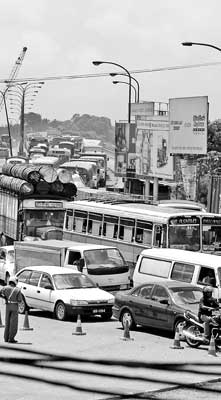
Social costs of road indisciplineSince the liberalization of the economy a sector that has displayed sustained growth is transport. Relaxation of import restrictions resulted in an unmanageable influx of vehicles into the country playing a dominant role in energizing the economy. While the railways continued to deteriorate road transport took a heavy beating.
An efficient and a safe transport network is considered a vital ingredient for sustainable higher economic growth and regional development. Due to recent initiatives taken by the government road networks in the rural areas are given a new facelift while under the tsunami rehabilitation some of the major highways such as Colombo-Matara road have been given a new lease of life offering motorists the required comforts. According to the Central Bank new registration of motor vehicles recorded a 31% increase in 2006 in comparison to 2.6 % in 2005. Buses and motor vehicles have increased by over 50%. Trishaws (57% increase) have become a major utility in public transport but the authorities have failed to take any action to regulate this sector through safety needs and enforcement of meters for fares. The unfortunate accident at Induruwa has brought untold misery and helplessness to a large number of families which cannot be explained in monetary terms. The fact that this accident took place in the early hours of the morning does not indicate at that moment that there was any traffic congestion. The state has a duty to take appropriate steps to prevent deaths of this nature as much as the need to control terrorism and mosquito menace. Unlike war tragedies these are avoidable accidents. It is understandable that after a few weeks these incidents are forgotten until the next tragedy occurs, remembering the Ahungalle incident where an unprotected rail crossing accident snatched the lives of many innocent young school children and we helplessly watch these tragedies increasing. Some notable recent incidents are the Polgahawela rail tragedy where a bus driver in his characteristic style of racing on the public highway trying to go over a crossing within a closed gate caused a large number of deaths and many accidents where innocents are killed on the pedestrian crossings are common stories. Even at this very moment quite a number of unprotected rail crossings exist at much risk to the public. Dr Anil Jasinghe, Director of the Accident Service NHSL recalling his daily experience to The Sunday FT was very critical of the growing road indiscipline saying that’s the root cause of motor accidents. He was of the view that apart from speeding and parking offences there are many other indisciplined acts of motorists that escape the eyes of the law. Colombo being the big city where most people visit Dr Jasinghe was of the view a pilot project should be launched to educate and discipline motorists enabling the message to be spread island wide. Traffic arrangements in the city should be a model for the whole country in both discipline and safety. It is no secret that most drivers in the city are ignorant of the fundamentals of the traffic rules such as lane discipline and respect for pedestrian crossings; this also indicates the weaknesses in the regulatory agencies that are responsible for issuing driving licenses. It’s time the Police as the law enforcement agency and other responsible groups such as the universities, medical and the legal profession join hands to eradicate this social disaster to save innocent lives. Perhaps they could give a start from the schools and then reach the elders. The public highway is a reflection of a nation’s discipline and orderliness. The lack of such discipline as evident now in all spheres of life at all, levels and this too is a major impediment to economic progress as much as terrorism. Sri Lanka will be entering a new era in road transport with the completion of the first phase of the four lane Colombo-Matara expressway that’s progressing well and due to be completed by end 2008. These initiatives though coming at a late stage in the history are most welcome and will give a new lease to the regions and hopefully improve the safety factor of the motorists and the pedestrians. The vulnerability of the lack of alternative roadways was clearly evident in the aftermath of the tsunami tragedy and the new lease for roads in these areas is most welcome. |
| || Front
Page | News
| Editorial
| Columns
| Sports
| Plus
| Financial
Times | International
| Mirror
| TV
Times | Funday Times|| |
| |
Copyright
2007 Wijeya
Newspapers Ltd.Colombo. Sri Lanka. |
